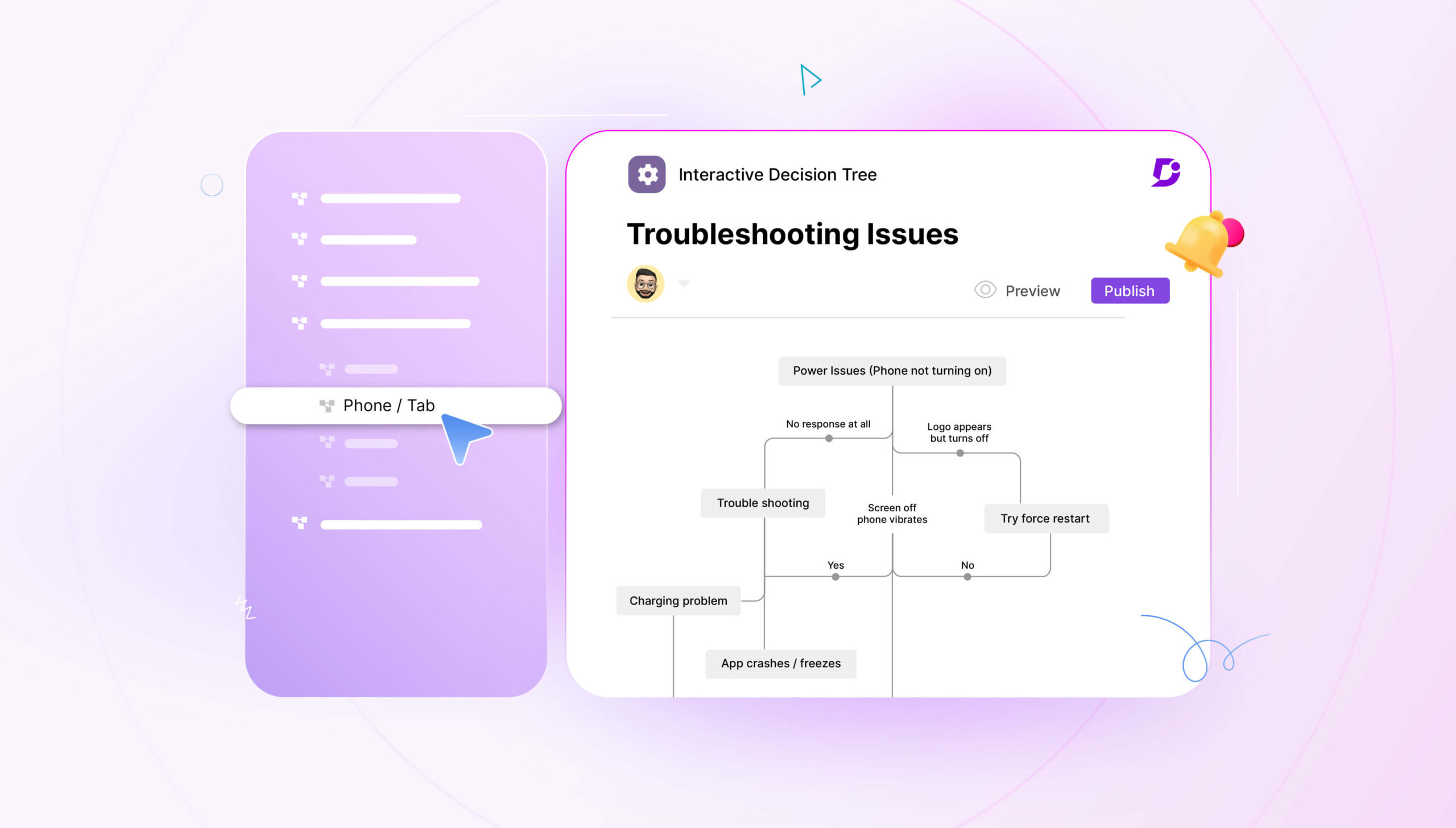Here’s a customer experience stat: 79% of Gen Z find the presence of knowledgeable sales representative to be a factor that enhances the attractiveness of making a purchase. Product knowledge for the sales team can help them respond better to sales questions and reduce the chances of prospects being frustrated with the process.
In this article, we’ll discuss the importance of product knowledge for sales and how you can train your sales rep to interact with customers with more accurate information.
What is product knowledge?
Imagine stepping into a store where you want to purchase computer hardware but have questions about the available product. Unfortunately, the sales rep doesn’t have an answer to any of your queries, and it’s possible you know more about computer hardware than they do. How would you feel about such an interaction?
The blatant display of poor knowledge about the products in that store would be customer experience. Now imagine that the reverse was the case and the sales rep answers all your questions convincingly enough to help you make the best decision for that moment.
This comprehensive response about the product in real-time and with much confidence discussing it in detail shows that they genuinely care about customer satisfaction. This is what product knowledge entails. Product knowledge is all about understanding everything there is to know about a product, from use cases to benefits and features. Every member of a sales team should have this. Anyone who needs to interact with investors or customers should have this skill. It can determine how much profit the business makes.
Types of Product Knowledge
Product knowledge encompasses different types, and here’s a look at them.
Price/ROI
Sales team members should understand the cost implications of their products and the return on investment (ROI) for customers. Customers will want to know if buying a product will be worth it, as the amount of value derived from the product will help justify the amount spent on it. Customers are often looking for products or solutions that provide a positive ROI. By discussing the cost and potential ROI, the salesperson shows that they understand the customer’s objectives and can help them achieve a favorable outcome..”
Customization
The power of a sales rep is in how much they can sell successfully. A successful sale hinges on how well you can make customers understand how well the product fits their vision and expectations. Research findings (McKinsey) indicate that embracing personalization frequently leads to a 10% to 15% revenue boost. The actual increase in revenue varies from one company to another, typically ranging from 5% to 25%, and this variance depends on factors such as the industry and the company’s proficiency in leveraging data to enhance customer understanding and closeness.
A customer-centric approach means the sales rep is trained on how products are customized for certain customer situations. Therefore, no matter what product you’re selling, you should understand how it can work for a diverse category of customers, whether individuals or businesses.
How to use it
If the sales rep needs help understanding how to use a product or how it works, how can they convey this information successfully to customers? Therefore, sales teams should be armed with ample information, including examples and case studies, on the step-by-step use of products. A sales rep for a car company should have information on the level of car sales within a specific region and the typical longevity of the cars before there’s a need for replacement.
Features
You need to understand the features of a product or service to discuss it convincingly or answer any questions from potential customers. That’s pretty much just you shooting in the dark. Every sales rep should be able to answer basic questions about their products.
If you’re a sales rep for a company that owns a booking app, you should have answers to questions like, “Can I incorporate live video interviews into the booking app?” or “Does your booking app offer reporting and analytics?” If you don’t have the answers to these basic technical questions, there’s a high chance you won’t be closing that sale.
Finding questions or support
Sales reps should help guide customers toward getting the correct answers to their questions. This also includes providing support when they need assistance or clarification on issues. Therefore, this type of product knowledge for the sales team aims to find answers to questions and provide all-round support to prospective and long-term customers.
Product road mapping
How well is the sales rep keyed into the lifecycle of the products? Sales reps need to be fully aware of the product’s evolution over the next few months or even as long as a year. Therefore, your sales team should know if you have a new product on the way and then mention this to customers to keep them as engaged as possible.
Also Read: Knowledge mapping within Knowledge management
Uses of Product Knowledge in an Organization
How can different roles within an organization utilize and benefit from product knowledge? Here are a few examples.
Sales Representatives
With sufficient product knowledge, sales reps can use this to answer the questions and queries of prospective customers. They can also utilize product knowledge to guide
prospects on how to get the best out of the product. Therefore, it’s all about attending to the needs of customers and successfully closing sales.
Customer service representatives
Customer service reps can use product knowledge to provide adequate support to existing customers who need information about the product or face issues requiring immediate expert responses. The reactions can be valuable feedback relevant to the product team, who will use this to improve customer needs.
Product managers
Feedback is instrumental to the growth of your product as this will reflect the needs of your customer base and address their concerns. Therefore, product managers should be able to understand the product vision and communicate this seamlessly to all stakeholders. They can also provide sales documentation that contains step-by-step processes to help sales reps close sales.
Product developers
Since product developers are concerned with the more technical aspects of the product and how this helps to solve customer queries, their role is different. They are more concerned with efficient collaboration with other development team members to ensure that the product remains functional at optimal levels at all times. They also maintain quality.
Product Designers
Product designers are responsible for the physical outlook of the product, ensuring that it’s both aesthetically pleasing and has a user-friendly interface. Therefore, their product knowledge also links to the customer needs and expectations, as this will guide further updates during the product lifecycle. User feedback and data will form the basis of their designs.
Product Marketers
Product marketers can design and implement effective marketing campaigns through product knowledge to entice prospective customers toward their brand. The right campaign will feature a detailed look into how valuable the product can be to customers. Product managers also need product knowledge derived from crucial analytics and performance metrics to understand and optimize customer behavior.
Leaders & Stakeholders
These are at the top of the pyramid within an organization, and they need to understand the vision and mission of their products. Understanding this is key to sharing this vision with other team members while guiding them with strategic goals and direction for organizational growth. Leaders and stakeholders can use this product knowledge to inspire their team members to contribute to its success.
How product knowledge can improve sales success
You should always appreciate product knowledge for sales teams. The more you know about a product, the better you can convince others to buy. Product knowledge inspires confidence in your sales team to interact effectively with prospects. Therefore, when all their questions are answered effectively, and they are made to see the value proposition of your products, there’s a high chance that these prospects will be converted to paying customers.
An intuitive knowledge base software to easily add your content and integrate it with any application. Give Document360 a try!
GET STARTED
Benefits of Having Product Knowledge in Sales
There are several impressive advantages of having product knowledge in sales. This helps you stay ahead of the competition while encouraging positive interactions with prospects.
Product knowledge gives us the satisfaction of being experts
Sometimes, it’s about more than just prospective customers being happy. A deep level of satisfaction is attached to being knowledgeable about your product. It inspires confidence in every sales rep, knowing they are adequately equipped with the skills and product knowledge they need to interact extensively with prospective customers without faltering. Therefore, product knowledge can make sales managers feel accomplished as experts.
Product knowledge helps you respond to any objections properly
While trying to close a sale, customer objections are inevitable. However, a sales rep’s response to these customer objections can be the thin line between onboarding a new customer and losing several prospective customers. Most objections are questions that customers have no answers to and erroneously believe will lead to a negative experience while using your products. However, when these objections are properly managed, this is your ticket to an incredibly successful sale. One of the best ways to respond to objections properly is to be armed with accurate product knowledge to allay customer fears. Ensure that your sales team is updated on the latest information about your product.
Product knowledge lets you understand your competitors better
Thanks to the widespread nature of the internet, access to information is unrestricted by stringent roadblocks. You can have an informed customer base through the vast amount of knowledge available on the internet. Customers always want to provide insights into products online and compare this to similar products from competitors. Through a high level of research on this information, you can analyze it and use this to increase the chances of a successful sale.
Product knowledge gives your prospects confidence in you
Sales teams with accurate and timely product knowledge will inspire confidence in prospective customers. They understand that the sales reps know what they are talking about as they reflect their skills and expertise while communicating ideas accurately to customers. As the sales rep answers every customer inquiry with deep insight, this gives the prospects confidence in you. Product knowledge empowers the sales team to handle customer interactions beyond their expectations, thereby increasing the chances of product adoption and brand loyalty.
Check out, How Safebreach Transformed Product Knowledge Training with Document360:
How to Improve Product Knowledge in Sales Teams?
Improving the product knowledge in the sales team requires deliberate efforts and the use of resources.
Create Comprehensive Training Programs
Comprehensive training programs, including mentors and skilled coaches, can help bridge any product knowledge gap within your sales teams. These training programs should incorporate technology, including live streaming platforms where experts can demonstrate your product in real-time and answer feedback from the sales team during the sessions.
Provide Accessible Resources
Training can also be a personal process where resources are available to sales team members whenever needed. This is where an online knowledge repository comes in. Visual resources like infographics and videos should be available to sales managers and representatives to break the learning process into relatable material. This will help to retain their attention. Also, these will be readily accessible, so anyone can easily reference them long after the product knowledge training is over.
Regular Product Updates
Ensure that your sales reps are always aware of product updates and their impact on customers. Therefore, there’s a need to carry every team member along with progress reports. Engage them in the process and ensure every team member is included in product development phases.
Hands-On Training
Hands-on training involves actively using the products where sales reps can learn on the go. This will encourage team members to freely share their insights and experiences as they navigate hurdles together. Hands-on training is practical and result-oriented.
Gamification
Who says impacting product knowledge in sales teams has to be boring? Make the learning process fun for your sales team by incorporating games. Games are entertaining and challenging, while your sales rep can engage better with content on product knowledge. This can be using flashcards that help the sales rep review everything they have learned about your products, increasing retention ability.
Continuous Learning Culture
Encourage a continuous learning culture within the sales team by utilizing a knowledge base. This online library contains resources that can be useful for your sales rep. However, the significant advantage of this is that they can gain instant access to comprehensive answers to their questions without the need to contact anyone first. Therefore, they can bookmark this content and check it out anytime. This also makes onboarding of new team members easier.
Conclusion
Give your sales team the leverage to take your brand ahead of the competition by implementing a sales enablement strategy using Document360.
Frequently Asked Questions
-
What is product knowledge in sales?
Product knowledge refers to a sales team’s understanding of a product’s features, benefits, pricing, and use cases to assist customers and close sales confidently.
-
Why is product knowledge important for a sales team?
Product knowledge enables sales reps to provide accurate information, build customer trust, handle objections effectively, and differentiate their products from competitors. A well-informed sales team enhances the customer experience, leading to higher conversion rates and brand loyalty.
-
What are the types of product knowledge?
- Price/ROI: Understanding cost and value for customers.
- Customization: Tailoring the product to customer needs.
- Usage: Knowing how the product works.
- Features: Understanding technical aspects.
- Support: Answering customer queries effectively.
- Roadmapping: Knowing future updates and enhancements.
-
How does product knowledge improve sales?
It boosts sales confidence, helps answer objections, and strengthens brand credibility, leading to higher conversions.
-
How can Document360 help with product knowledge?
Document360 provides a central knowledge base for easy access to product details, training materials, and FAQs, improving sales and support.




 –
– 

